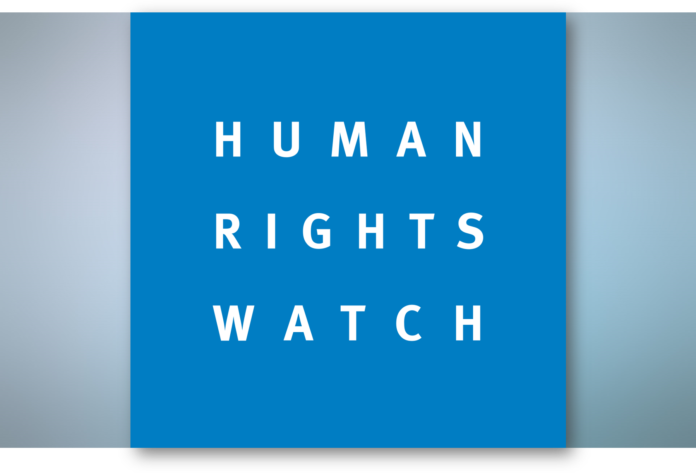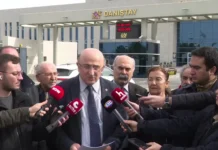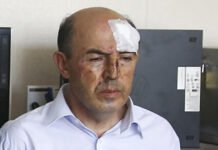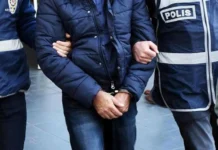The abusive mass arrest of Turkish lawyers damages the rule of law and blatantly seeks to identify lawyers with the alleged crimes of their clients in violation of international law, Human Rights Watch (HRW) said in a Wednesday press statement.
According to the human rights watchdog, the arrests and raids, conducted under the guise of terrorism allegations, were a chilling demonstration of the Turkish government’s disrespect for the rule of law and for the role of lawyers in ensuring suspects an effective defense.
“The legal profession, and specifically defense lawyers, are once again being targeted in mass operations of the kind we have sadly seen repeatedly over the past four years,” said Hugh Williamson, Europe and Central Asia director at Human Rights Watch. “Beyond smearing the individual lawyers, this latest operation seeks to further erode the legal profession’s ability to uphold the rule of law and to ensure that everyone accused of a crime enjoys their right to a legal defense.”
The statement comes in the aftermath of the arrest of 47 lawyers in dawn raids on September 11, 2020 and a search of their offices. The Ankara Chief Public Prosecutor’s Office issued detention warrants for 60 people including 48 lawyers, seven legal interns, four dismissed judges and a law school graduate over their alleged affiliation with the Gülen movement, a religious group inspired by Turkish cleric Fethullah Gülen.
The prosecution accuses the defense lawyers, trainee lawyers and three dismissed judges, “under the guise of attorneyship activities,” of acting on the orders of a terrorist organization because of the legal work they perform on behalf of their clients. They accuse them of attempting to influence the criminal investigations in favor of the organization.
The Turkish government deems the Gülen movement a terrorist organization. It accuses the group of masterminding a July 15, 2016 coup attempt in Turkey. The movement strongly denies involvement in the coup attempt or any terrorist activity.
The detentions come in the aftermath of the news that Turkey’s governing party has started working on an amendment to the law on lawyers following President Recep Tayyip Erdoğan’s call on September 1 for the suspension of lawyers deemed to have links with terrorism. In his speech to mark the beginning of the judicial year, Erdoğan said, “We will do what is necessary to cut off the bloody path from attorneyship to terrorism.”
The new criminal investigation is the latest of many similar investigations into lawyers over the past few years, which Human Rights Watch documented in detail in a 2019 report. According to HRW the Turkish government has an appalling track record of abusing the legal system, and in particular misusing terrorism charges, to pursue government critics, despite the absence of evidence of material connection to violent acts of terrorism. Lawyers have repeatedly found themselves targeted and associated with the crimes of their clients.
Bar associations throughout Turkey, including in Istanbul, Ankara, Izmir and Diyarbakir, as well as professional associations from around the world have also raised strong concerns about the mass arrest of the lawyers and the assault on the legal profession it represents.
Recent arrests in #Turkey of 48 lawyers and 7 intern lawyers aggravates the systematic repression against lawyers and their representative organizations imposed by the government. Since 2016, more than 1600 lawyers have been arrested and 441 of those lawyers have been convicted.
— Diego García-Sayán (@UNIndepJudges) September 15, 2020
In a tweet yesterday United Nations Special Rapporteur on the Independence of Judges and Lawyers Diego García-Sayán said, “Recent arrests in #Turkey of 48 lawyers and 7 intern lawyers aggravates the systematic repression against lawyers and their representative organizations imposed by the government.” The special rapporteur also called on the “international community to condemn the attacks to the Rule of Law and the violation of the #UN Basic Principles on the Role of Lawyers, whose function is a fundamental right for the society.”
#Turkey: My statement regarding the systemic repression against lawyers and their representative organization by the Turkish government. Here is my take on this situation. On #Vimeo https://t.co/954TmmiZ5C
— Diego García-Sayán (@UNIndepJudges) September 16, 2020
In a joint statement 22 organizations from around the world on Wednesday also called on the Turkish government to release the lawyers immediately, investigate those responsible for the arbitrary arrests and to fully comply with the UN Basic Principles on the Role of Lawyers.
Kamile Özbulut, an Ankara lawyer, told Human Rights Watch she was detained at 5:30 a.m. on September 11 by a group of police officers. The officers took her from her home in Ankara, which she was using as her office, and confiscated her telephone, three laptop computers and other electronic devices, such as memory sticks, without taking copies. In violation of the Law on Lawyers, the search and seizure was conducted without a prosecutor or lawyer present.
Özbulut was permitted to bring her 20-day-old baby with her when she was detained. She and her baby were not placed in a police cell, but she was held at the Organized Crime Department of the Ankara Security Directorate and interrogated later the same day. She was taken before a court on the morning of September 12 and released, subject to conditions. Human Rights Watch learned from other Ankara lawyers that another detained lawyer who was pregnant was also interrogated and released in the same time period.
At least 44 other lawyers were also detained at the Organized Crime Department of the Ankara Security Directorate. The lawyers were taken to the Ankara Courthouse in handcuffs on September 14, where the court extended their detention for four days. On September 15 five more lawyers were reportedly interrogated. None have been brought before a court, and 44 remain in police custody.
In Özbulut’s interrogation, a record of which Human Rights Watch has seen, police showed her a list of 67 lawyers, claiming all were suspects, and asked which ones she knew.
The authorities focused on her financial arrangements with her clients, whether she had contracts with them or had provided them with receipts for payment. They asked about phone conversations she had with relatives of clients and other lawyers, which the police had wiretapped. The prosecutor’s investigation is ongoing and subject to a secrecy order, but the focus in the questioning on her activities as a lawyer suggests that the prosecution has little, if any, evidence of Özbulut having committed criminal activity relevant to a terrorism investigation.
Human Rights Watch has seen the interrogation record of another lawyer which similarly focuses on phone calls between him and other lawyers and whether his clients had paid him to represent them. As with Özbulut, it suggests the authorities have no evidence that links the lawyer to terrorism beyond his function as a legal representative.
The Ankara Bar Association’s Lawyers Rights Center has raised multiple concerns about violations of legal procedures in the searches of lawyers’ offices and homes. A representative of the center also raised the lack of safeguards in the context of the Covid-19 pandemic with Human Rights Watch.
Ankara has a high number of cases of Covid-19 in relation to the rest of the country, according to the government and the Ankara Medical Chamber. While in custody, three of the detained lawyers were found to have elevated temperatures. One tested positive for the virus that causes Covid-19 and was released. The risk that others may have been infected during detention remains a concern. The authorities seem to have taken no meaningful precautions to maintain social distancing.
When they were detained, they were held together for about two hours on a police bus. They had no individual medical examinations, but the police brought a doctor onto the bus. The doctor shouted: “Was anyone hit?” (“darp edilen var mı?”) before leaving without examining anyone. The lawyers were then transferred to the basement cells of the police department, which have no windows and poor ventilation. The Lawyers Rights Center is concerned that the prolongation of custody in airless and insanitary conditions puts the lawyers at further risk of Covid-19.
Most lawyers targeted in recent years have been accused of Gülenist links, but the crackdown has also targeted lawyers representing Kurds and leftists accused of links to the outlawed Kurdistan Workers’ Party (PKK) or to outlawed revolutionary left groups such as the Revolutionary People’s Liberation Party/Front (DHKP/C). Both groups are recognized as terrorist organizations by Turkey, the US and the EU.
The attack on lawyers has also extended to bar associations. In July, the government pushed through a new law aimed at greatly diminishing the authority of bar associations in Turkey’s main cities of Istanbul, Ankara and Izmir and curbing their authority on a national level through the Ankara-based Union of Turkish Bar Associations, the umbrella organization representing all provincial bar associations.
“Recent moves against the legal profession in Turkey should be seen in the context of the Turkish authorities’ deep assault on the rule of law and human rights, especially the right to a fair trial,” Williamson said. “Having gained control over prosecutors and judges, the government seems intent on controlling the legal profession, too, and completing its onslaught on the rule of law.”















